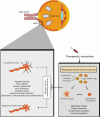Erratum to: Immune maintenance in glaucoma: boosting the body's own neuroprotective potential
- PMID: 20046842
- PMCID: PMC2798980
- DOI: 10.1007/s12177-009-9037-3
Erratum to: Immune maintenance in glaucoma: boosting the body's own neuroprotective potential
Abstract
Glaucoma, a slow progressive neurodegenerative disorder associated with death of retinal ganglion cells and degeneration of their connected optic nerve fibers, has been classically linked to high intraocular pressure. Regardless of the primary risk factor, degeneration may continue, resulting in further loss of neurons and subsequent glaucomatous damage. During the past decade, scientists and clinicians began to accept that, in addition or as an alternative to fighting off the primary risk factor(s), there is a need to protect the tissue from the ongoing spread of damage-an approach collectively termed "neuroprotection." We found that the immune system, the body's own defense mechanism, plays a key role in the ability of the optic nerve and the retina to withstand glaucomatous conditions. This defense involves recruitment of both innate and adaptive immune cells that together create a protective niche and thereby halt disease progression. The spontaneous immune response might not be sufficient, and therefore, we suggest boosting it by immunization (with the appropriate antigen, at specific timing and predetermined optimal dosing) which may be developed into a suitable therapeutic vaccination to treat glaucoma. This view of immune system involvement in glaucoma will raise new challenges in glaucoma research, changing the way in which clinicians perceive the disease and the approach to therapy.[This corrects the article on p. in vol. .].
Figures

Erratum for
-
Immune maintenance in glaucoma: boosting the body's own neuroprotective potential.J Ocul Biol Dis Infor. 2009 Jun;2(2):73-77. doi: 10.1007/s12177-009-9025-7. Epub 2009 Jul 21. J Ocul Biol Dis Infor. 2009. PMID: 19672467 Free PMC article.
References
-
- Quigley HA, Maumenee AE. Long-term follow-up of treated open-angle glaucoma. Am J Ophthalmol. 1979;87(4):519–525. - PubMed
-
- Kass MA, et al. The ocular hypertension treatment study: a randomized trial determines that topical ocular hypotensive medication delays or prevents the onset of primary open-angle glaucoma. Arch Ophthalmol. 2002;120(6):701–713. - PubMed
-
- Leske MC, et al. Factors for glaucoma progression and the effect of treatment: the early manifest glaucoma trial. Arch Ophthalmol. 2003;121(1):48–56. - PubMed
Publication types
LinkOut - more resources
Full Text Sources
Miscellaneous
